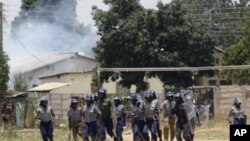Zimbabwe's three main political leaders have a key meeting Friday to try and stop violence that is threatening progress towards free and fair elections and economic recovery. The Joint Monitoring and Implementation Committee, or JOMIC, will open an investigation into a sudden surge of violence against the Movement for Democratic Change party (MDC).
ZANU-PF leader President Robert Mugabe, MDC leader Prime Minister Morgan Tsvangirai, and Welshman Ncube, leader of the small MDC party, will meet in a more formal environment than their regular weekly get-togethers as the nearly three-year-old inclusive government faces increasing political and economic trouble.
The JOMIC met Wednesday ahead of the summit and said that party leaders must stop giving mixed messages to supporters.
“At political party leadership we are able to sit and engage and talk and joke but it is not translating to the lower levels of our political parties," said Priscilla Misihairabwi-Mushonga, who represents the small MDC on JOMIC and is a longtime negotiator for political reform.
"It is important therefore we begin to cascade the values and statements we are giving out as political party leadership and ensure that those issues also cascade to the lower levels.”
Elton Mangoma represents the MDC, which won the 2008 elections. He was also at the JOMIC meeting Wednesday.
“It is the commitment we want to see from the political party leadership so what they say in public is what they say in private," said Mangoma. "This violence will consume this nation and will take us backwards.”
Justice Minister Patrick Chinamasa represents ZANU-PF on JOMIC and he said violence would undermine the credibility of the next elections.
“A peaceful environment is very critical to our future for economic recovery and development and conducive to the forthcoming free and fair elections," said Chinamasa. "It goes to the bone of contention.”
MDC supporters have reported increasing attacks and harassment in recent months, including the disruption of many MDC political rallies.
Veteran Zimbabwe analyst Brian Raftopoulos said the surge in violence may be the result of political impatience by ZANU-PF connected to Mugabe’s age and his health, as the party needs him as a candidate for the next polls. The president will be 88 early next year.
“Mugabe’s health is not improving, in fact is deteriorating," he said. "That they need to get an election where he is still available as a candidate.”
South Africa’s facilitation team, which has a mandate from the Southern African Development Community to help Zimbabwe move toward undisputed elections, says it hopes SADC will call a high-level security meeting to address this surge in violence.
Piers Pigou is the new project director for southern Africa for the International Crisis Group and says that the violence is connected to groups in ZANU-PF who want elections before 2013.
“It seems to be associated with calls for elections in early 2012, which are clearly being resisted by the MDC, the SADC facilitation team and civil society groups,” said Pigou.
MDC secretary-general Tendai Biti said the police did not assist those attacked by ZANU-PF youth at an MDC rally last Sunday that had to be abandoned.
Zimbabwe Leaders Meet to Discuss Surge in Political Violence




